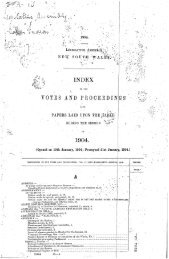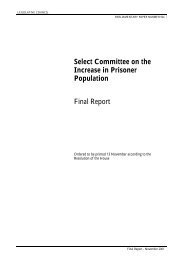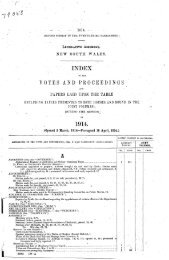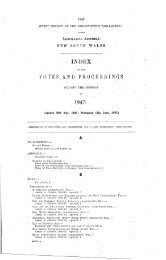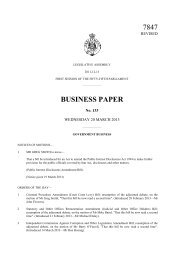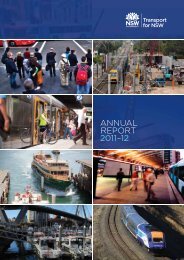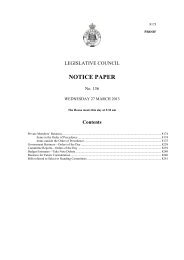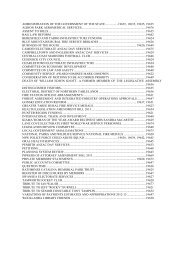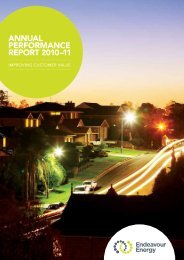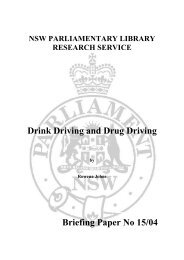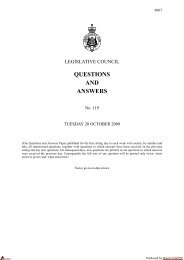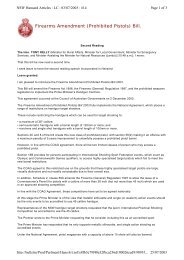Questions & Answers Paper No. 158 - Parliament of New South ...
Questions & Answers Paper No. 158 - Parliament of New South ...
Questions & Answers Paper No. 158 - Parliament of New South ...
You also want an ePaper? Increase the reach of your titles
YUMPU automatically turns print PDFs into web optimized ePapers that Google loves.
7040<br />
LEGISLATIVE ASSEMBLY QUESTIONS AND ANSWERS<br />
MONDAY 12 OCTOBER 2009<br />
along the Pacific Highway?<br />
(2) If yes to (1), what are the projected traffic volumes for the Pacific Highway for the next five years<br />
(2010-2014 inclusive)?<br />
(3) (a) What are the current traffic volumes for the Pacific Highway (the most recent data collection to<br />
date)?<br />
(b) On what date was this data collection made?<br />
Answer—<br />
I am advised:<br />
(1) Yes.<br />
(2) The RTA has engaged traffic consultants to model traffic on the Pacific Highway multiple times in<br />
the past twenty years. There have been changes to the Pacific Highway and adjacent road network<br />
configurations since the most recent modelling was undertaken, which means that predictions for the<br />
2010 to 2014 period are not available from this modelling.<br />
The Federal Bureau <strong>of</strong> Infrastructure Transport and Regional Economics has produced a Working<br />
<strong>Paper</strong> (no.75) that provides traffic growth predictions for major roads including the Pacific Highway.<br />
This work covers the period 2005 to 2030. The predicted annual average growth rates range from<br />
1.38 to 1.89 percent depending on location.<br />
(3) (a) The number <strong>of</strong> vehicles per day on points along the Pacific Highway ranges from just under<br />
10,000 to over 50,000, with the average for the whole length being around 15,000 vehicles per day.<br />
(b) The latest broad traffic count survey was undertaken in 2007.<br />
*7329 TRANSPORT MANAGEMENT CENTRE—Mr Andrew Stoner asked the Minister for Roads—<br />
In relation to the Transport Management Centre:<br />
(1) How many staff work at the Transport Management Centre (TMC) in Eveleigh?<br />
(2) What is the title <strong>of</strong> the highest-ranking staff member at the TMC?<br />
(3) For (2), how much is the current annual salary for this position indicating all extra benefits provided<br />
including complimentary extras, fuel allowance, and provision <strong>of</strong> a vehicle?<br />
(4) Who currently holds this position?<br />
(5) Where will the recently announced Transport Co-ordination Group (TCG) operate from?<br />
(6) How many staff within the TMC will work on the NSW Government's newly announced TCG to<br />
deal specifically with peak-hour congestion problems?<br />
(7) What will be the title <strong>of</strong> the highest-ranking staff member at the new TCG?<br />
(8) For (7), how much will the annual salary be for this position indicating all extra benefits provided<br />
including complimentary extras, fuel allowance, and provision <strong>of</strong> a vehicle?<br />
(9) Will this position be advertised?<br />
Answer—<br />
I am advised:<br />
Information on the Transport Management Centre is available from the RTA website (at<br />
www.rta.nsw.gov.au).<br />
The Transport Coordination Group brings together senior operational representatives from the Roads and<br />
Traffic Authority, CityRail, State Transit, the private bus industry and Sydney Ferries to oversee the<br />
morning and afternoon peak commuting periods in Sydney.<br />
This dedicated, experienced Group means that, during peak travel hours, our best and brightest are<br />
focussed on keeping transport services running smoothly. They're keeping an eye on what matters most to<br />
commuters, and that's improving their daily travel to work and home.<br />
These transport experts are monitoring traffic flows, observing patterns <strong>of</strong> delays and developing<br />
strategies to eliminate those systemic problems.<br />
When a disruption occurs, the Group ensures the blockage is cleared as soon as possible - getting<br />
replacement services out to commuters and aiming to provide fast, accurate and reliable information to<br />
passengers so they can make informed decisions about how to travel. During major disruptions, this may<br />
mean travelling by bus instead <strong>of</strong> ferry, or delaying travel while the problem is fixed. Good information<br />
makes for good decisions, and we owe that to commuters.<br />
Produced by Alts<strong>of</strong>t Xml2PDF



